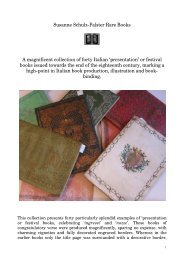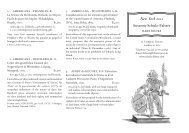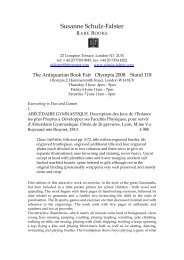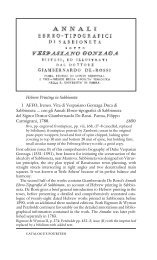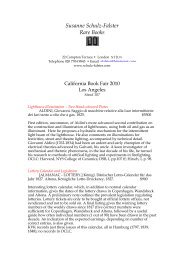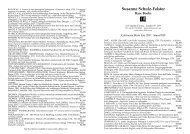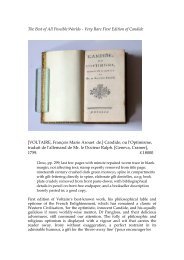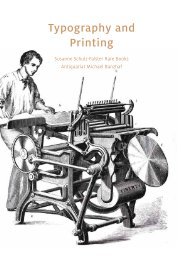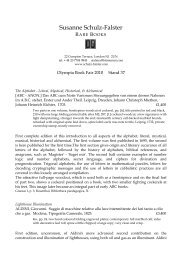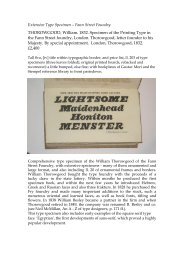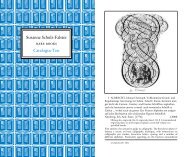«Merge Record #»«Title» - Susanne Schulz-Falster
«Merge Record #»«Title» - Susanne Schulz-Falster
«Merge Record #»«Title» - Susanne Schulz-Falster
You also want an ePaper? Increase the reach of your titles
YUMPU automatically turns print PDFs into web optimized ePapers that Google loves.
ooks, but does not even allow them access to the master catalogue. There is one type of<br />
catalogue, which may be consulted by librarians only, and another 'public one'.<br />
Not much is known about the author, and it has even been claimed that the treatise was<br />
in fact written by Vincenzo Follini, librarian at the Magliabecchiana Library in Florence.<br />
This seems somewhat unlikely, as Follini published a response to Della Santa's work.<br />
This treatise on library organisation proved highly influential, and was reprinted in 1996. For a detailed<br />
study see Giovanni Solimine and Flavia Cancedda' review article in the Bollettino AIB 1997, no. 2, pp. 240-<br />
241.<br />
Cogito, Ergo Sum<br />
23.<br />
DESCARTES, Réné. Principia Philosophiae. Amsterdam, Ludovic Elzevir, 1644.<br />
[bound with:] DESCARTES, Réné. Specimina philosophia: seu dissertation de methodo<br />
rectè regendae rationis, & veritatis in scientiis investigandae: dioptrice, et meteora. Ex<br />
Gallico translato, & ab auctore perlecta, variisque in locis emendate. Amsterdam,<br />
Ludovic Elzevir, 1644.<br />
$16000<br />
Two works in one volume, 4to, pp. [xxii], [ii] blank, 310, [2] blank, woodcut device on title and<br />
numerous woodcut illustrations in the text; [xvi], 331, [1] blank, woodcut device on title and<br />
numerous woodcut illustrations in the text; a fine copy in full contemporary vellum, with<br />
overlapping edges, manuscript title to spine.<br />
First edition of the Principia and first Latin edition (translated by Etienne de Courcelle)<br />
of Descartes' Discours de la Méthode (1637), which had been revised by Descartes.<br />
Although issued independently, these two works are often found bound together.<br />
Descartes was the first of modern philosophers and one of the first modern scientists; in<br />
both branches of learning his influence has been immense.<br />
I. The Principia is one of the most influential books in the history of science, presenting<br />
Descartes' system of physics and cosmologies, and the 'principles of his philosophy in<br />
four parts: [1] metaphysical and cognitive principles; [2] the principles of nature (laws of<br />
motion, etc); [3] the structure of the universe (celestial physics); (4) an explanation of<br />
physical phenomena such as fermentation, magnetism etc.' (T. Verbeek in Dictionary of<br />
Seventeenth and eighteenth-Century Dutch Philosophers, I, (p. 254-260).<br />
II. The Discours de la Méthode is here in the Latin translation, by which it reached its<br />
greatest circulation, and the first to contain the famous dictum 'cogito, ergo sum'. The<br />
Discours is Descartes' fundamental work in philosophy and on the method of science.<br />
'Descartes's purpose is to find the simple indestructible proposition which gives to the<br />
universe and thought their order and system. Three points are made: the truth of<br />
thought, when thought is true to itself (thus cogito, ergo sum), the inevitable elevation of<br />
its partial state in our finite consciousness to its full state in the infinite existence of God,<br />
and the ultimate reduction of the material universe to extension and local movement.<br />
From these central propositions in logic, metaphysics and physics came the subsequent<br />
inquiries of Locke, Leibniz and Newton; from them stem all modern scientific and<br />
philosophic thought' (PMM 129).



